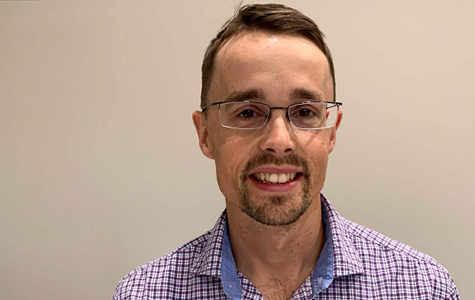Feature: Enriching the trainee experience
As a newly established physician seeking to broaden his horizons, Dr. Ian Brown says Windsor was the perfect landing spot.
After finishing his residency at the University of Toronto, he began his clinical practice on the Internal Medicine floors at Windsor Regional Hospital’s campuses. Then the emails started coming in.

“There are so many opportunities to help out with the education program at Schulich Medicine & Dentistry. You get one email about an opportunity, then another about something else and find what speaks to your expertise and interests.”
Dr. Brown started off with a little bit of everything. Teaching students and residents on the wards of the hospital and in the classroom, supervising small groups for residents, academic coaching and even proofreading residency match applications were all part of his repertoire.
“It was something new and different from the daily grind of clinical practice. It keeps me engaged with the content and the learners, and I don’t want to lose touch with the perspective they bring. And it’s neat to experience the next generation coming up,” he explained.
But what cemented his involvement with the School was his appointment as the Academic Director of Medicine for Postgraduate Education at the Windsor Campus. He enjoys the ability to support the residents’ learning experience, ensuring their program runs smoothly and receiving their feedback and concerns.
“I had just come out of residency myself a few years prior. It felt like I was really fresh, and still had the same mindset as the residents and students coming through,” he said. “I could use my own experiences to make it better for them, because I was just there.”
Enriching residents’ experiences takes a number of different forms; from creating two Internal Medicine rotation teams so that doctors have a lighter caseload and a greater capacity to focus on training residents to upgrading the long-lamented Wi-Fi in the Medical Arts Building.
Having attended medical school at St. George’s University in Grenada, which emphasized a strong theoretical approach to medicine, and completing clerkship and residency at very large medical centres in Detroit and Toronto, Dr. Brown says he appreciates Schulich Medicine’s distinct emphasis on providing ample experiential learning opportunities to students.
“When I came back to Canada to begin my residency, I felt I was excelling in terms of my baseline knowledge, which was great. But I didn’t have as many meaningful opportunities for patient interactions until I was senior resident,” he explained.
The smaller, tight-knit learning community, as well as the quality of resources, such as the simulation labs, were what excited him about getting more involved in the program.
“And that extends to the faculty as well, I felt very welcome,” he said.
In addition to his clinical practice, teaching and administrative duties, Dr. Brown is also involved with the Rapid Assessment and Management Program (RAAMP) clinic, run by Dr. Wassim Saad. RAAMP addresses gaps in community care for cancer patients and pre-malignant patients, helping to rapidly refer these patients to the appropriate cancer centres or specialists.
“Typically, it’s hard to get pre-malignant patients referred to a cancer centre without a diagnosis. The centre helps connect patients who might have had an abnormal blood test or a mass on imaging, something that needs to be addressed quickly, when it might be difficult for the family doctor to achieve that,” Dr. Brown explained.
Although he’s kept busy, he says he wants to stay ahead to best educate his students and trainees. “It keeps me on my toes, because things change really quickly – especially nowadays.”









